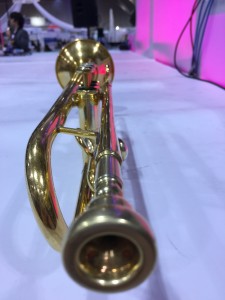 ON THE HORN
ON THE HORN
As I haven’t written a blog in over 4 weeks now, I can certainly find a lot of topics to discuss. However, I wish to keep my blogs to a reasonable length and would offer one element that has come up, both in discussion with other players as well as a student of mine:
“The body likes consistency, it truly is the holy grail of trumpet playing”
What do I mean with this? If you want success on a brass instrument (or perhaps anything you do), you have to earn it and put the time into it. Nothing is obtained because you think that you deserve it. A question that has come up is “Where should I be after 3 years of playing?”. The answer to this question has a few factors, one of which is “That depends on how many days out of 3 years or 1,095 days you have practiced”. This made me think about my own playing and how I can help my students, depending on what kind of player they want to be.
From my own experience, I can categorize my playing journey into three phases:
The hobby phase
When I was in high school, I wouldn’t necessarily say I was a trumpet player. Not a serious one at least. I enjoyed playing trumpet, it gave me tremendous pleasure and enabled me to participate on some great trips. I didn’t really take it serious though. I had no routines, no mindset of what kind of player I wanted to be. All that mattered was that I could pass my exam and hang out with my friends.
I did have a few trumpet lessons, both with Wayne Tindale (Principle trumpet for the Kingston Symphony) as well as Mark Pydra. This was likely the most serious element in this phase of my playing.
The good: I had a fantastic time playing the trumpet, it didn’t matter that I missed half the notes or that I wasn’t improving in a measurable way.
The not so good: I had no idea what the capabilities of the trumpet really were, nor did I care. However, It would have been good to have some element of “here is what a good trumpet player sounds like”, as this would have given me a target at least and might have provided some motivation.
By knowing that a student is in this category, I can design a lesson plan based on my own experience that is not too time demanding but would still increase productivity marginally, pending on how often the trumpet makes it out of its case (or bed as my son calls it). I reminded my student that consistency is the way to success. You cannot accumulate “points” every time you play and trade them in for an increased level of playing.
The part time musician, full time professional corporate sheep
This would likely include my time at Humber from 2004 until just recently, November of 2015. What I found during these 11 years (wow, I can’t believe I’m looking back this far) was that I did make some headways in terms of playing. I developed an “OK” sound, however, depending on how often the trumpet would make it onto my chops, I would have a tremendous difference between “Good” and “Bad” playing days. It seemed that some days, could sound half decent while other days, I would not have the skillset to figure out how to get out of the sinking hole we trumpet players call “bad” days.
The good: I was more focused than in my previous “hobbyist” phase on fundamentals. Going to Humber certainly helped with that. I got a little taste of what it feels like when you’re having an AMAZING day on the horn. For me, when I have days like this it’s amazing how for that moment, there seems to be no worries in life, nothing matters but playing this piece of twisted metal and making it sound as good as I can.
The not so good: Without consistent practice, the strength built up quickly went away when one day off turned into one week off and even one month off. There are very few exceptions to the rule of consistent playing. I am not even aware of a player who said “I took a month off and when I picked the trumpet back up, it was EXACTLY the way I left it”. For me, endurance and tuning were the first issues that developed after only 2 minutes of playing in a band. Forget playing lead when you are in this position, as the stamina needed just wasn’t there. When the sax player in front of you complains about not being able to hear the lead trumpet part, you know you have an issue.
Phase 3: the final frontier – nothing but trumpet, all day, any day, every day
The professional musician, or as I call it, the career musician. I should say that there are certainly some fine players that are the exemption to the rule from the other two phases. However, by far the most notable players that can achieve an undeniable mastery of the horn are those that have dedicated at least some, if not all, of their life to nothing but playing trumpet. You have to breath and LOVE the instrument. Practicing, while there are days that I feel less inspired to do so, is almost like waking up and brushing my teeth these days. It’s just part of my daily routine. I feel fortunate that my 2-year-old son also shares in this routine. In fact, there are days when he say’s “OK daddy, trumpet!”. I have seen more growth in the last 3 month waking up and doing a 20 minute warm up (always the same) and than incorporating other routines. I likely practice between 2 and 5 hours on a given day, pending on other life events that take place (my wife like’s that I’m doing something I love, but also needs me to still do chores).
The not so good: I have taken a 75% reduction in my pay.
The good: I LOVE PLAYING TRUMPET AGAIN. The bad days are still here, like that neighbor next door that should just move!, however, it’s no longer an issue of being in shape. Overall it’s been a fruitful 3 months. Everything about trumpet is elevated by consistent practice: endurance, confidence, dexterity, range, etc.
Now, I realize that not everyone has this luxury. Unlike when I went to Humber, I’m embracing this moment in my life and making the most of it. I LOVE PLAYING THE TRUMPET!
 OFF THE HORN
OFF THE HORN
I have started teaching at a private music school, Lippert Music Centre (www.lippertmuisc.com), located on Pape north of Danforth. If you know someone in the area, I am there every Tuesday.
I also wanted to discuss the importance of communication, something that has been a source of inspiration. After leaving Humber, it became less and less frequent to communicate with other musicians. There are of course close friends that I have kept in touch with over the years, but talking to professors who I admire and inspire to be like was less and less. My advice to anyone at Humber or any post secondary, make sure you take advantage of the professors that you have access to while at school. It is easy to get lost in the internal bubble of the college or university, forgetting that once you leave this place of higher learning, staying in touch with these fountains of knowledge becomes harder and harder. If you don’t ask your professors questions every day you are at school, you are not realizing the true potential!
Thanks in part to my blog and increased social media activities, I have been able to talk to several people that I’ve either never really had interactions with, or re-connect with past teachers. Andy Gravities called me one day. I love talking to him about trumpet and music business and seeing what he’s experience has been like. A musician from the city I grew up in (Kingston ON), reached out to me when I was having a rough week. Thank you RICK! Steve McDade decided to call me and give me some cold-hard facts about life as a musician. I was also able to connect with Jerry Caringi because I realized that even though I went to Humber, I had no idea what to charge for certain gigs. I don’t want to undercut and don’t want to lose gigs because I over-charge. I’m finding that the stage I’m sharing with people that have been in the industry for a long time is less like a “shark tank” where we all swim around waiting for the next gig, and more like a community where open and honest conversations can be had. Reach out to people in the business, young and not so young.
ON A

If you read my last blog (and who in their right mind hasn’t: P), I have an update on my efforts with regards to the churches I’ve contacted. Out of 150 contacted, I got 5 requests to play. As it happens with a few key days in the year where there doesn’t seem to be enough trumpet players in town, the requests were all for Palm and Easter Sunday coming up. I had to give gigs away to other players. On Easter Sunday, I’m able to play two Easter services (lady luck!). My message to anyone who’s trying their kick at making a living with music:
“WHAT ARE YOU DOING TO GET YOUR OWN GIG?”
I realize the state of the music business is not the same as in the 1980s. However, I WILL NOT give in to the notion that music is obsolete. As my friend Matt Jefferson from Maniacal 4 pointed out the other day, when considering the global community, we are in 1% of the population that can send a message by playing an instrument. I’m not able to qualify this statement, but tend to believe Matt, even though he is a trombone player.
DON’T SAY NO to revenue potentials. Over the past 3 months I have done things I didn’t even think of doing:
Transcriptions: I’ve done a total of 5 horn transcriptions for various clients
Recordings: I have been asked to record up to 10 trumpet parts for a Latin band, in the comfort of my home
eBook: I have been asked by a Bach endorsed trumpet artist from the USA to assist him with his new eBook, laying it out in MS Publisher and also doing transposition work in Sibelius.
The Band-Aids: A friend of mine and I have started a concept that will hopefully contribute to breaking down the financial barriers in hopes to restoring equity in elementary and secondary schools that have underfunded music programs. Our children DESERVE the same opportunities I had when I went to school. Music, despite what some might say, is an important developmental tool that can be a medium to teach life lessons such as team work, leadership, and will directly show kids the difference between “Earning” and “Deserving”. I deserve to play a high C, but I won’t get to unless I earn it by putting in some serious time on the horn.
Yes, the music industry is not like it used to be. NO! the music industry is NOT like the milk delivery man and has gone obsolete. Instead of having a golden goose lay a really well paying gig on your breakfast table, you now have to go out into the wild. Some days you will return with a handful of worms, other days you will have a Rib Eye steak cooked medium-rare. What you put in is what you get out. There are some great younger players that have started diversifying. Have you?
 BLOG
BLOG
As if this blog isn’t long enough, I wanted to start following up on the advice of my friend Matt and start making some videos.
The first series of videos are aimed at students and well, me! I am interested in having some form of recorded documentation to measure my own progress throughout the next year. I want to see what having the drive to practice every day will achieve.
Given that I have never done a video before, I thougth I would offer something to my students or anyone who’s interested and/or asked “Hey, what in the world are you doing these days, blowing that trumpet like some addict who just can’t wait for the next line”
I wanted to offer a “first take” on everything. This is not about a polished ready for performance video, more a behind the scenes look at the undocumented grind that I’m sure all trumpet players go through.
My Warm up: Warm up Explained (click here for video)
My Warm up: Mouthpiece (click here for video)
My Warm up: Ex.1: Long tones (click here for video)
